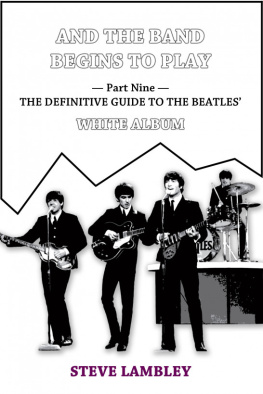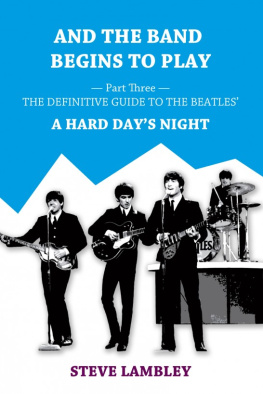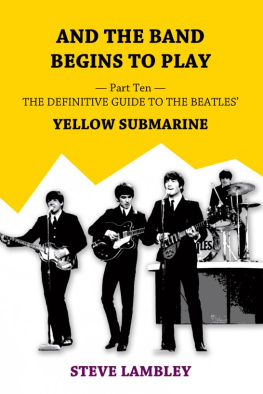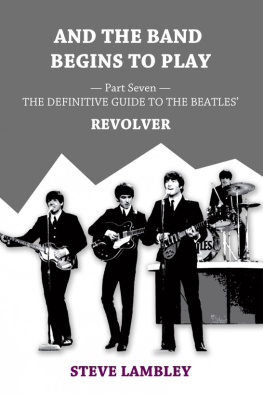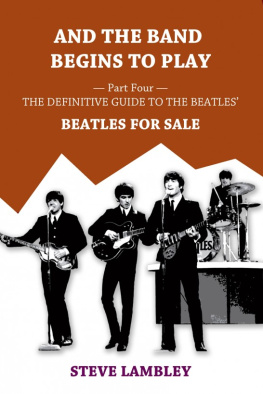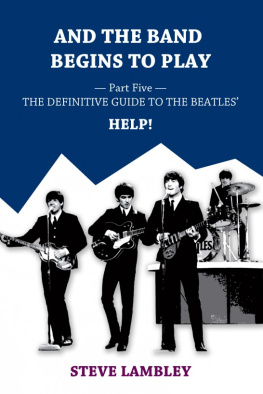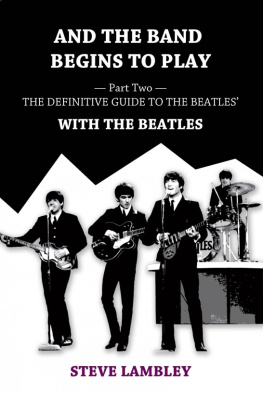AND THE BANDBEGINS TO PLAY
Part Eight The Definitive Guide to the Beatles SGT PEPPERSLONELY HEARTS CLUB BAND
by
SteveLambley
Published bySLIDE Books
Version 2.0
Steve Lambley2015
All song lyricsremain the copyright of their respective owners, and are quoted forthe purposes of scholarship, under fair dealing and fair usagelaws. No infringement is intended.
No part of thisbook may be reproduced in any form without written permission fromthe copyright holder.
SmashwordsEdition, Licence Notes
This ebook islicensed for your personal enjoyment only. This ebook may not bere-sold or given away to other people. If you would like to sharethis book with another person, please purchase an additional copyfor each recipient. If youre reading this book and did notpurchase it, or it was not purchased for your use only, then pleasereturn to Smashwords.com and purchase your own copy. Thank you forrespecting the hard work of this author.
Table of Contents
Single release
Parlophone R 5570 Released 17 February 1967
The SgtPepper sessions started on 24 November 1966 with a song thatwas destined not to appear on the album Strawberry FieldsForever. The group had not been together in the studio for overfive months, largely as a result of individual projects such asJohn filming for Richard Lesters How I Won The War andGeorge travelling to India to study music and philosophy, and notleast because of a world tour. Events on this tour were to alterthe course of the Beatles career and to ensure Revolversplace as a watershed in the groups musical progression. For thiswas the tour on which Imelda Marcos was snubbed, Americans burnedtheir LPs, and the Beatles played in front of an audience for thelast time.
The ImeldaMarcos incident was born of misunderstanding and not a littleaudacity on the part of the Philippine authorities. Bearing in mindthe pressures put on the group to appear before dignitaries,ambassadors and the like, it is surprising that a similardiplomatic incident had not already taken place. Before the firstof two concerts in Manila on the afternoon of 4 July, it had beensuggested to Brian Epstein that the group might pay a courtesyvisit to the Philippine First Lady and her children. This had notbeen confirmed, but nevertheless Mrs Marcos had, unbeknown to Brianor the group, arranged a reception for 200 of the islandsaristocracy to meet the Beatles. Officials arrived at the Beatleshotel at 11.30 am to escort the four to Malacaang, thePresidential palace, but as the group were still sleeping and noengagement was on their itinerary anyway, Brian sent the escortsaway and gave the matter no further thought. The concerts wentahead as planned, but the reports that followed on the televisionand in the newspapers were not of the music, but of the snubbing ofthe Presidents wife. News footage showed place-cards being removedfrom tables and a disheartened Mrs Marcos wandering through thepalace.
The followingday, when the tour was due to leave for home via India, the extentof the Filipino fury at this slight of the national heroine by agroup of unprincipled foreigners was clear. The staff at the hotelrefused to touch the groups baggage and their limousine was madeunavailable to them, compelling them to take taxis to the airport,some of which took tortuously long routes. When they finallyreached the airport, all security had been withdrawn, andescalators, lifts and flight information boards had been switchedoff. The entourage, and the Beatles themselves, had to run thegauntlet of staff and an ugly crowd, some having guns; they werekicked and punched Brian in particular being hit in the face andribs. Having boarded the plane several hours late and with the KLMpilot threatening to take off at any moment because of the enormousdelay and fuel supply problems, Tony Barrow and Mal Evans wererecalled by customs to sort out a passport query. The planeeventually took off with everyone on board, to the intense reliefof all concerned. On his arrival in London a couple of days later,George was asked by a reporter what was next on the agenda. Weregoing to have a couple of weeks to recuperate before we go and getbeaten up by the Americans.
Which isexactly what happened, because the group flew headlong into thebigger than Jesus storm. Some five months previously, John hadgiven an interview to a journalist friend from the LondonEvening Standard, Maureen Cleave. In the full-page article,a soberly written piece in which he was characteristicallyoutspoken on many of his usual preoccupations (Sex is the onlyphysical thing I can be bothered with any more, I feel sorry for[Julian]. I couldnt stand ugly people even when I was five, Iwant the money just to be rich), John said:
Christianitywill go. It will vanish and shrink. I neednt argue about that; Imright and I will be proved right. Were more popular than Jesusnow; I dont know which will go first rock n roll orChristianity. Jesus was all right but his disciples were thick andordinary. Its them twisting it that ruins it for me.
Given thestature of the group at the time, the observation that they weremore popular than Jesus could be seen as fair comment, and in theUK it didnt generate any commotion. But shortly before theBeatles US tour, the article was reprinted in America and thecomments taken out of context by the press and radio stations inplaces such as Birmingham, Alabama and Nashville, Tennessee. Thingsgot to such a pitch, with mass LP-burning, the involvement of theKu Klux Klan, and even assassination threats, that Brian, who wasmeant to be in North Wales recovering from glandular fever that hadbeen exacerbated by the Marcos incident, was forced to fly to theUS to try to calm the situation. There he discussed with the NewYork theatrical agent Nat Weiss the possibility of cutting theirlosses and cancelling the tour. Once in America, John tried toexplain. He was greatly upset by the reaction and was concernedwith the effect it was having on the other Beatles, with the threatto his own safety, and with the fact that people disagreed soviolently with what he said. Prior to facing the press conferencein Chicago on 12 August, he reportedly broke down and cried. Butonce in front of the cameras, his attitude was somewhat defiant.John saw apology as a sign of weakness, and his behaviour in thepress conference reflected this.
I wasntknocking it, or putting it down, I was just saying it as a fact,and its true, more for England than here. Im not saying thatwere better or greater or comparing us with Jesus Christ as aperson or God as a thing or whatever it is. I just said what I saidand it was wrong, or it was taken wrong, and now theres allthis.
After beingasked twice if he was prepared to apologise, John said
I never meantit to be a lousy anti-religious thing. I apologise if that willmake you happy. I still dont know quite what Ive done. Ive triedto tell you what I did do, but if you want me to apologise, ifthatll make you happy, then OK, Im sorry.
But the damagehad been done and the tour degenerated into further torment,lumbering chaotically to 29 August and Candlestick Park, SanFrancisco, where 25,000 fans witnessed the Beatles last everappearance on stage. It was a typically half-hearted live showwhere any music coming from the stage was inaudible behind a wallof screams.
John andGeorge particularly had had enough. George told Hunter Daviesthere was no satisfaction in it. Nobody could hear. It was just abloody big row. We got worse as musicians, playing the same oldjunk every day. John added Weve had enough of performing forever. I cant imagine any reason which would make us do any sort oftour ever again.
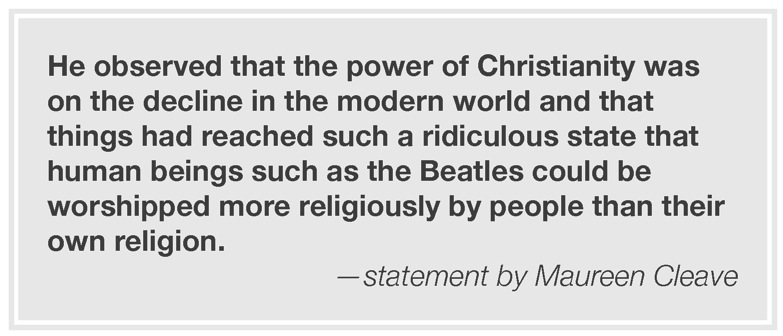
Next page
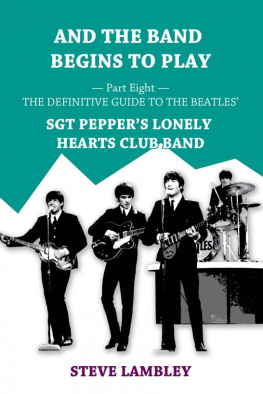
![Lambley - And the Band Begins to Play: [Part1 The Definitive Guide to the Beatles Please Please Me]](/uploads/posts/book/213741/thumbs/lambley-and-the-band-begins-to-play-part1-the.jpg)
![Lambley - And the Band Begins to Play: [Part9 The Definitive Guide to the Beatles White Album]](/uploads/posts/book/213743/thumbs/lambley-and-the-band-begins-to-play-part9-the.jpg)
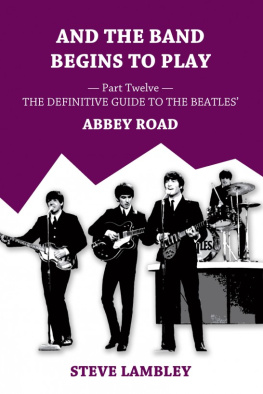

![Lambley - And the Band Begins to Play: [Part6 The Definitive Guide to the Beatles Rubber Soul]](/uploads/posts/book/213742/thumbs/lambley-and-the-band-begins-to-play-part6-the.jpg)
